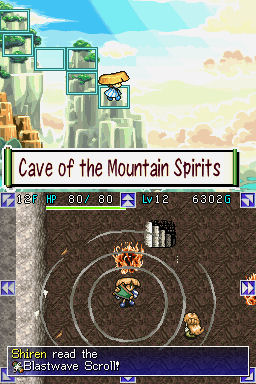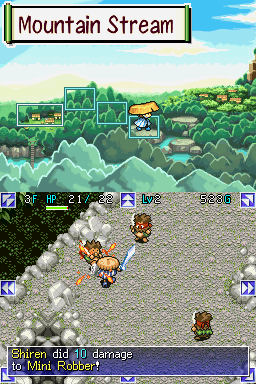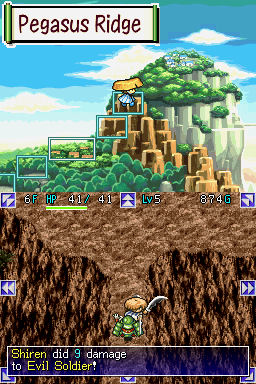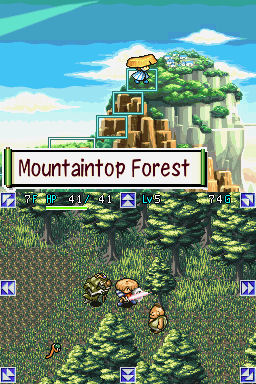Mystery Dungeon: Shiren the Wanderer (Nintendo DS) Review
By Karn Spydar Lee Bianco  25.03.2008
25.03.2008
Shiren the Wanderer falls into the somewhat obscure genre of games known as roguelikes: a subset of role-playing games which borrow gameplay features (such as randomised dungeons, and severe consequences for death) from Rogue, an ASCII-fuelled PC title from the early 1980s. Although the DS already has a few roguelikes in its arsenal (including another entry in the Mystery Dungeon series in the form Pok
Shiren is a port of a Super Nintendo (Famicom) title which was only ever released in Japan under the name Fushigi no Dungeon 2: Fūrai no Shiren. It was the second instalment in the Mystery Dungeon series and the first to feature characters which weren't borrowed from another franchise (the original Fushigi no Dungeon starred Torneko/Taloon from Dragon Quest IV). Both versions of the game, which are set in a fictional representation of feudal Japan, put players in control of Shiren, a ronin accompanied by his trusty companion Koppa (a talking weasel), as the two embark on a quest to find the legendary Land of the Golden Condor. It is this quest which will be your first and main goal when you begin playing, although you'll soon find that there is plenty of content to keep you occupied upon its completion. But we're getting ahead of ourselves. Let's take a step back and look at the game's core gameplay mechanics.
As a roguelike, Shiren primarily takes place in a series of dungeons which become more and more challenging as you delve further into them. Each grid-based floor within a dungeon is randomly generated and features a selection of monsters to fight (there are more than 180 kinds in all), traps to circumvent and items to collect. Gameplay is turn-based, but generally far swifter than your usual menu-based RPG combat. Every time you perform an action (be it initiating an attack or using an item, etc.) you use a turn and everyone/thing else in the dungeon gets to do the same. This chess-like system, although simple, becomes key to the game's strategic depth as you become accustomed to exploiting it. As well as having access to a series of usable items (be they herbs, staves, jars, etc.) Shiren can equip a single weapon, shield, armband and a selection of arrows. Levelling up occurs after earning experience points from dispatching monsters, much like it does in any other RPG. But it is here that any comparison to the likes of Final Fantasy must come to an abrupt end.

You see, when you die in Shiren the Wanderer you don't simply hit load and head back to the most recent save point, you really die. Well, sort of. You lose your accumulated experience points, your equipment, your progress, everything really. One minute you could be moments away from clearing a dungeon and the next you'll be back in Canyon Hamlet (the game's starting town) at level 1 with nary a Medicinal Herb to your name. This fact alone should be enough to tell you whether or not this game is for you. Right now you're either be so appalled at the idea of losing hours of progress in an instant that you would rather play Superman 64 for the rest of your life, or you're intrigued by the idea of having 'real' consequences for death in a game for once. Indeed, if you can wrap your head around the fact that this game will be kicking your arse when you start out (and for quite a while after that...), Shiren represents a refreshing change of pace when compared to the save-die-load-repeat dynamic that so many modern games/gamers rely on.
Still with us? Excellent. While the above statements are all true, there are some exceptions to the rules which prevent Shiren from being comparable to, say, classic arcade games in their complete lack of in-game persistence. A number of warehouses exist in certain towns which you can store items in for your next run through the game. Any items stored therein won't disappear upon death, allowing you to gradually stockpile a wealth of resources before you take on more challenging tasks. Furthermore, the first fifteen floors of the game (those leading up to Table Mountain, the first main dungeon) can be backtracked through in order to return to Canyon Hamlet. Doing so allows you retain any items or money you've collected during that particular 'adventure' (the name given to each excursion from the time you begin the journey until your inevitable demise/return to the first town). Although your level/stats will be culled as per usual, it is possible (and eventually essential in order to take on certain dungeons) to greatly power up weapons/shields, both of which support the usual '+number' modifiers, a la Dungeons and Dragons.

Beyond the aforementioned features, Shiren's various NPCs further develop the idea of in-game persistence by responding differently to your presence each time you come across them after being 'reborn'. Certain NPCs can even be recruited to join you on your travels, but not before you've seen them/helped them out on multiple playthroughs. Once you realise that the entire game has been developed in a way that assumes you will die over and over (and over) again, the prospect of progress-scrapping upon death becomes less of “an archaic gameplay concept that should have been scrapped with the introduction of memory cards”, and more of an integral part of a genre, which despite appearances, has little in common with many of the other RPGs currently on the market. In fact, the key to enjoying Shiren and being a successful Wanderer is to learn from your mistakes and constantly generate new strategies to overcome the game's various challenges. It's an idea that is entirely contrary to many role-playing games which reward you for simply levelling up until you're ready to progress (not that Shiren is entirely free of grinding, of course – some of the unlockable, DS-exclusive dungeons do require rather powerful equipment before you can even think about taking them on).
As you may have guessed by now, much of Shiren is focused on in-dungeon combat. The combat system is sublimely simple on a superficial level, but quickly becomes more complicated as you familiarise yourself with more and more monsters and items. Attacking is as simple as tapping A when standing next to a monster (or when in line with one if you're firing an arrow), but you won't be able to succeed if you rely on strength alone. You're going to need cunning, strategy and out-of-box thinking for each and every situation. Indeed, there is an in-depth selection of 50 'mini-games' in the game's first town which are designed to teach you just such thinking. Stuck in a room with tens of monsters coming in from every direction? Attack them all at once with a Blastwave Scroll. Need to slow an incoming foe which you know will pulverise you just as soon as it gets close? Use a Staff of Paralysis to paralyse it before making a hasty escape. Want to combine the explosion damage-reducing effects of the Blast Shield with your pumped up Armor Ward? Use a Meld-Jar and combine the two into one super-item. It sounds like gobbledegook now, but Shiren's strongest draw is the way it removes the focus from improving your character, and places it on improving yourself and the way you play the game.

Although Shiren is absolutely a single-player game, the DS version introduces a surprisingly enjoyable new Traveller Rescue feature which brings with it a strong community focus. Upon dying, players are offered a chance to send out a distress signal via the Nintendo WiFi Connection (or to any local DS systems). Said signals can either be picked up by anyone the player has traded friend codes with, or by a random wanderer. The rescuer must then proceed to work their way through the game until they reach the point at which the deceased snuffed it. The risks are great (rescuers can take their own items with them and risk losing them, or try their luck at going in naked), but the rewards can be fantastic. Successful completion of a rescue earns at least one item (some of which can only be acquired by completing rescues), plus the possibility of two more (one of which the rescued player is free to send as part of a thank you note for a mission well done).
Despite our first instinct that the feature would be all but ignored, we soon discovered that not only is undertaking a rescue great fun, but others seem to think so to! We've sent out a few requests over the past week, and all but one has been answered (and completed) by the time we next picked up our system. Further online support comes in the form of extensive high score boards which cover two months of high scores across all in-game dungeons (the 100 top scores are viewable for each) plus a selection of 'Legendary' high scores which record miraculous feats such as completing dungeons at level 1, or without any items. Combined with the game's inherent replayability as a result of its simple-but-deep gameplay mechanics and a ton of bonus dungeons to explore, these two WiFi features should help ensure that you'll be playing Shiren the Wanderer for weeks, if not months to come.

Cubed3 Rating
Great - Silver Award

Mystery Dungeon: Shiren the Wanderer is a sublime example of the roguelike genre. Unfortunately, that means its probably going to turn off more people than it will turn on. Shiren takes no prisoners and demands that you rely on your own wits rather than an endless slog of level griding. It's a title which reminds you that games are supposed to be about the journey, and not the destination. Learning to play the game well is such a rewarding experience in and of itself that completing dungeons simply becomes the icing on the cake. It may not be a game for everyone, but those that can truly immerse themselves in Shiren the Wanderer will discover one of the most enjoyable experiences the DS has to offer.

![]() 8/10
8/10
![]() 8/10
(1 Votes)
8/10
(1 Votes)
 Out now
Out now  Out now
Out now  Out now
Out now  Out now
Out now Comments
Comments are currently disabled

 Sign In
Sign In Game Details
Game Details Subscribe to this topic
Subscribe to this topic Features
Features





 Top
Top

